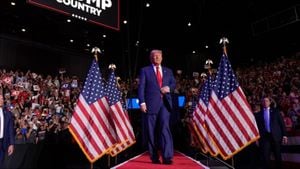Uncertainty surrounding the upcoming U.S. presidential election is creating waves across global financial markets, as investors react to shifting polls and economic forecasts. The spotlight is particularly on the race between incumbent Vice President Kamala Harris and former President Donald Trump. Polling data suggests Harris is gaining momentum, leading to significant fluctuations in currency valuations and market sentiment.
The U.S. dollar has faced downward pressure, recently dipping to its lowest point in two weeks against major currencies. Reports indicated the dollar has decreased by 0.6% against a trade-weighted basket, signaling uncertainty and caution among traders. Meanwhile, the euro and British pound recorded gains against the dollar, with the euro rising by 0.7% to $1.0910 and the pound increasing by 0.4% to $1.2975.
This market activity is largely attributed to investor reactions to the potential outcomes of the election. Analysts refer to the "Trump trade," where investors had anticipated Trump's return would lead to policies potentially stoking inflation and, by extension, prompting the Federal Reserve to raise interest rates. This higher interest rate environment would typically boost the dollar's attractiveness; hence, the recent shift away from Trump has flipped those expectations on their head.
Matthew Ryan, who leads market strategies at Ebury, commented on the situation, explaining how the seeming decrease of Trump's chances could influence immediate economic forecasts. He suggests, "If Trump wins, we might see increased disposable incomes and consumer spending due to his tax policies. This could initially strengthen U.S. growth." Nevertheless, there are concerns about how this growth might affect longer-term inflation levels.
The proximity of the election results, with key swing states showing tight margins, adds to the volatility. While Harris is leading nationally, the tight competition means investors remain skittish. Historical patterns reveal significant market swings depending on election outcomes, and this year appears no different, with currencies and stock indices fluctuated throughout the day.
Meanwhile, the global markets are also reacting to various macroeconomic indicators. The Federal Reserve has already priced expectations for interest rate cuts due to changing economic conditions, with indications pointing toward potential reductions of 25 basis points by early next year. Simultaneously, successful economic indicators from Europe hint at resilience within the region's markets.
This interplay of domestic and international economic data feeds investor caution. Currency traders are bracing for wild fluctuations tied directly to election developments, with anticipation building as the U.S. approaches Election Day.
Across Asia, the initial market reactions have mirrored those seen stateside. Indian shares are reportedly inching lower as domestic investors grapple with the same election-related uncertainties. The Sensex dropped significantly, reflecting widespread apprehension over potential policy shifts depending on the election outcome.
Traders are not only fixated on the immediate election outcomes but are also pondering how the results may shape longer-term U.S. economic strategies. The likelihood of different policy agendas from either candidate creates distinct investment landscapes. Trump's focus on tax reductions versus Harris's investment strategies set the stage for contrasting economic directions, making investor forecasting particularly complex.
Meanwhile, as other international markets react, European stocks have seen mixed results. The FTSE 100 rose slightly, taking cues from buoyant energy stocks following projections of rising oil prices. This uptick is juxtaposed with the underlying sentiment of uncertainty stemming from the U.S. electoral situation.
The complex web of global interactions emphasizes how interconnected modern economies really are. Energy markets remain stable but are prepared for possible shifts depending on the outcomes of the U.S. elections and near-term policy decisions. Investors are heavily focused on the potential for new economic measures, especially those related to trade, which could have far-reaching global impacts.
For many market watchers, gauging the sentiment of traders as they navigate their way through uncertain waters is both challenging and fascinating. Overall, the upcoming U.S. election demonstrates not just the political stakes at play but also the financial ramifications of political uncertainty, influencing market confidence and currency stability across the globe.
Market experts assert the importance of keeping abreast of real-time updates as Election Day draws near, highlighting the necessity for quick adaptation to changing market conditions. It now appears absolutely clear: the world's financial markets are going to remain on high alert through to November 5 and beyond, reflecting the outcomes of this contentious election season.



